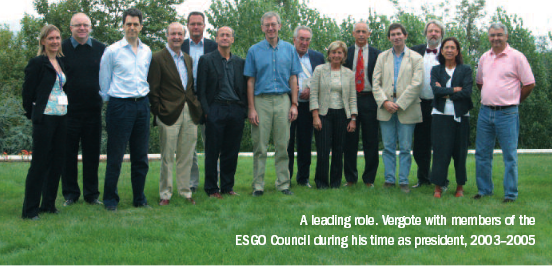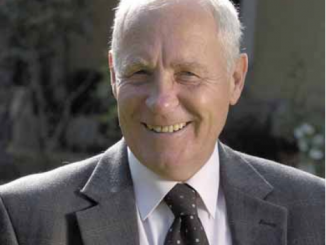
When Ignace Vergote opted to specialise in gynaecological oncology, his country wasn’t ready, and he’s been waiting for the world to catch up with him ever since.
Professor Ignace Vergote is a busy man. Arranging even an hour of his time is a difficult business, and when I meet him in his office at the University Hospitals Leuven, in Belgium, I can’t help commenting on his seemingly impenetrable schedule. He looks at me coolly. “But I suspect one of the reasons you want to talk to me is because I’m busy,” he says.
He has a point. Vergote, professor at the Katholieke Universiteit Leuven and chairman of the Department of Obstetrics and Gynaecology and the Cancer Institute at University Hospitals, Leuven, is interesting because he has packed so much into his 56 years – as a gynaecological oncologist, researcher, teacher and champion of European collaboration in research and practice. The ‘shortened’ curriculum vitae he sends me is 79 pages long.
Vergote sees himself more as a European than a Belgian, and he has been a pioneer in developing gynaecological oncology as a speciality in Europe. An investigator on some of the most important clinical studies on gynaecological cancer in the past 20 years, he was a president of the International Gynecologic Cancer Society and of the European Society of Gynaecological Oncology and chairman of the EORTC Gynaecological Cancer Group.
Currently, he is gynaecology section editor of the European Journal of Cancer, chairman of the European Network of Gynaecological Oncological Trial groups (ENGOT) and president of the Flemish Society of Obstetrics and Gynaecology.
“You might call me a workaholic,” he says. But he suggests this isn’t a word he would choose. Instead, the story he tells reveals a single-minded resolution to develop the speciality of gynaecological oncology from scratch in Europe, and then steer it as serenely as possible through the choppy waters of professional territorialism and international differences. Collaboration on an international basis is the only way forward clinically and politically, he believes.
A first for Belgium
Vergote was the first trained gynaecological oncologist in Belgium. He decided on pursuing the speciality very early in his career. After studying medicine at the University of Ghent, he specialised in obstetrics and gynaecology at the University of Antwerp. His teacher at the time, Frans Uyttenbroeck, was very interested in gynaecological oncology and supported Vergote’s desire to train more in the field. The sub-speciality had been recognised in the USA since the 1960s, but on this side of the Atlantic it was well established only in Scandinavia.
So in 1984 Vergote went to the Department of Gynaecological Oncology at Norway’s Radiumhospital in Oslo – the national centre for women’s cancers. He came back to the University of Antwerp in 1987 to put what he had learnt into practice.
But there was a problem. As a national pioneer in a new speciality, his role in relation to general gynaecologists was not clear, which led to confusion. And he was still required to carry out general obstetrics work much of the time, which was not ideal: “You have to make a commitment to your speciality to get better at it,” he says.
So in 1989 he took the radical step of returning to the Radiumhospital in Oslo as a staff member in gynaecological oncology, so that he could “get better”. He did. He stayed for another four years, first as head of the Division of Ovarian Cancer and Trophoblastic Diseases, then as deputy chairman of the Department of Gynaecological Oncology, receiving his PhD at the University of Oslo in 1991.
Scandinavia remains special to Vergote – on his office wall hangs a massive reproduction of “Mot Skogen” (Towards the Forest), by the Norwegian painter Edvard Munch, which was painted for Vergote with uncanny accuracy by his goddaughter. He is an honourary member of the Finnish Society of Obstetrics and Gynaecology, and nine years ago he was awarded the Norwegian Kolstad prize for Excellence in Gynaecological Oncology.
Belgium was ready for him on his second return, in 1993. As head of the Division of Gynaecological Oncology at University Hospitals, Leuven, he was part of the structures of a large referral centre and his role was clear. Gynaecological oncology was now much more firmly established in his home country.
“I think it took this time for patients, gynaecologists and oncologists to realise that there was a need for gynaecological oncologists, especially for cancers in the pelvic area, which can be particularly difficult to treat,” he says. “I was not alone any more – there were others who had the same training as me. Together, I think we succeeded in getting acceptance, and the same happened in neighbouring countries like the Netherlands, France, the UK.”
A survey carried out by Vergote in the mid-1990s showed that gynaecological oncology was recognised by board certification in only around 35% of countries worldwide. Vergote has been instrumental in encouraging change. As a council member and then president of the European Society of Gynaecological Oncology, he helped set up a system for recognising gynaecological oncology training centres.
“It doesn’t have legal status, but recognition from a European society means that trainees at these centres get an official certificate. I think this has played an important role in Europe.”
But the battle to gain official board-certification of the sub-speciality – even in his own country – continues. “In Belgium we have waited one and a half years for the government to enact the law that defines all oncological sub-disciplines,” he says, “and this applies to digestive oncology and respiratory oncology as much as gynaecological oncology. It still hasn’t happened.”
Unfortunately, the question of how a gynaecological oncologist’s role is defined in relation to other professions is also unresolved in many countries.
A question of how not who
“Who does the chemotherapy is a big question in gynaecological cancers, and it is different from country to country,” he says. “It’s a big issue in this country, but also many others – in Germany for example, it’s the gynaecologist who does the chemotherapy or the medical treatment.” His surveys revealed that in the 1990s, medical treatment of gynaecological cancers was given by gynaecological oncologists in around 50% of countries. Breast cancer was treated by gynaecological oncologists in 45%.
“I’d say that both specialities, medical oncology and gynaecological oncology, have their advantages – because medical oncologists have the general internal medicine and oncology training, while we know the disease better and have training that covers surgical and medical treatment.”
Vergote is determinedly conciliatory on this issue. He believes in the softly-softly approach to professional problem-solving and chooses every word he says to me with care, almost visibly calculating whether its effect will be positive or negative.
“It’s a… challenge,” he says. “But I usually say it doesn’t actually matter who does it. As long as it’s a caregiver who is really committed to concentrating on that disease full time, and is able to work in a multidisciplinary way. In treatment planning sessions here there is always a medical oncologist present, even though gynaecological oncologists give the medical treatment in my department. We discuss the cases together.”
“It doesn’t matter who does it, so long as they focus fully on that disease and work in a multidisciplinary way”
But although Vergote is generally a model of tact and moderation, there are three areas where he cannot help revealing frustration. One is the lack of profile that gynaecological cancers have compared to breast, lung and gastrointestinal cancers. He bemoans the lack of cancer leagues and patient support organisations in these areas, in Belgium and other small countries. And while Belgium has breast clinics with set minimum numbers of patients per surgeon and easily accessed nursing and psychological support services, equivalent centres and standards are not available for rare types of cancer like trophoblastic disease, which can be much more difficult to treat. “It’s not fair to the patients,” he says.
Another area of frustration surrounds the money available for trials of new treatments for gynaecological cancers. When new molecular target therapies were introduced around seven years ago, it was only their applications to the ‘big three’ markets – breast, lung and gastrointestinal cancers – that had been researched.
“That’s why there is still no reimbursed molecular target therapy in gynaecological cancer. It’s not because we don’t want it, or we’re not clever enough. You simply didn’t get pharmaceutical companies convinced that they should invest in gynaecological cancer, so the money for trials wasn’t there.”
At last, he says, now that the market is full of first, second, third and fourth lines of treatment for the big three, companies have started to look at ovarian cancer and are becoming interested in endometrial cancer. But cervical cancer is still almost entirely overlooked.
“Companies have started to look at ovarian cancer…but cervical cancer is still almost entirely overlooked”
His own department is now involved in 15 studies on targeted drugs for ovarian and endometrial cancer. Altogether, it produces around 140 papers on obstetrics and gynaecology and 45 on gynaecological oncology every year – and the evidence of its productivity is in the stark corridors outside Vergote’s office, where around 100 papers from peer review journals published in 2011 are posted on noticeboards.
The third area of frustration Vergote identifies is the enduring problem of obtaining clinical academic research funding. It is virtually impossible to get support outside the pharmaceutical industry, he says – and this inevitably has a major impact on what is, and what is not, researched.
“Apart from in the UK, there is almost no money available from governments for clinical academic research,” he says. “When it comes to pharmaceutical products, this is important because it’s clear that when you’re working with a pharmaceutical company, you are dependent on them, and there is a danger that you do what is in their interests. We all know that academic trials comparing one treatment with another are almost non-doable, even if it is in the interests of the patients or reimbursement. The same applies to surgery and radiotherapy, which as you know cures more cancer patients than medical treatment.”
Promoting academic trials
The urgent need for non-industry trials on drugs and academic trials on surgery and radiotherapy resulted in Vergote founding the European Network of Gynaecological Oncological Trial Groups (ENGOT) five years ago. This is a network of 17 national and regional academic trial groups which aims to make academic trials more feasible through collaboration, and to work with the pharmaceutical industry so that academia has input into industry trials.
But obtaining government funding for their work is not easy. “Recently, as chairman of ENGOT, I wrote to the EU Commissioner for Health, asking if we could get support for some academic trials in endometrial and cervical cancer,” Vergote laughs in exasperation. “But we were not listened to. I got a letter back saying that a lot of money had already been put aside for translational research. But that misses the point, because that money is for laboratory research and not for clinical academic research, certainly not for gynaecological cancers.”
The problem is well illustrated by Vergote’s own experience. When asked about the research he is most proud of, Vergote points to an academic study published a year ago in the New England Journal of Medicine, which was independently funded and has already had a global impact. Sponsored by the EORTC, it analysed outcomes in advanced ovarian cancer surgery according to whether the debulking surgery was timed before or during chemotherapy.
“I was very proud of this. But it took us ten years. We had to randomise 720 patients and, because it wasn’t sponsored, people had to be very committed and give their time for free – talking to patients, gaining informed consent, all these things without financial support. It’s very difficult. So I am proud of that.”
The next big hope
Given the constraints on research, and the timeconsuming nature of independent randomised controlled trials, where does the hope for progress in gynaecological cancers lie over the next decade? I suggest that robot-assisted surgery, which Vergote practises, shows real promise for improving surgery outcomes. Yes, he agrees, the potential is there. But nothing is proven – again because of the lack of results from academic randomised controlled trials.
“Even laparoscopy is not proven,” he says. “In endometrial cancer, we are still waiting for the survival results of a randomised trial from the US comparing laparoscopy with laparotomy. These types of things take decades.”
“Even laparoscopy is not proven… In endometrial cancer, we are still waiting for the results of a US trial”
What about advances in screening? Preliminary results from the UK Collaborative Trial of Ovarian Cancer Screening (UKCTOCS) have indicated that CA125 tumour marker testing combined with transvaginal ultrasound is a feasible mass screening technique. But again Vergote preaches caution. He wrote an editorial in the Lancet Oncology pointing out that survival benefit from such screening was not yet proven. He believes that more accurate tumour markers than CA125 need to be found – and his department is working on this problem.
“In 20 years, I think that maybe we will have a marker that will be more specific and good enough for screening. But I think it’s still too early to conclude that we have found it.”
The real hope for advances that have meaning for patients in the next 10 years come from new drugs and new drug combinations, he believes. They won’t necessarily cure more people, but they will lengthen survival.
“When I started in Oslo in 1984, we had only one drug, an alkylating agent, with a median survival of six months. But now, patients progress through an average of four or five lines of chemotherapy, and you also have drugs that obtain a nice response even in platinum-resistant disease. So median survival is now 46 to 48 months. There are now more possibilities of treatment when people relapse, and with the new targeted drugs we will have better drugs to get them in remission with fewer side-effects.
“The new PARP inhibitors for BRCA patients, anti-angiogenesis drugs, alpha-folate blockers and combinations of various targeted drugs – there’s so much going on that I believe we will improve survival, but mainly we will delay time to death. Of course, we all hope for the one molecule that will cure cancer or cure ovarian cancer, but it will be a combination of drugs and approaches.”
In the genes
Vergote’s cautious, data-driven optimism probably lies deep in his genes. His father was a finance director working for the Belgian government, and Vergote remembers that both his parents held medicine in very high esteem. No surprise, then, that all four of their children went into medicine or pharmacy. What is more surprising is that all four of those children found spouses who work in medicine, pharmacy and dentistry – Vergote’s wife is a dermatologist. Two of Vergote’s four children are also entering medicine – one is currently studying, and the other is practising internal medicine – with the other two opting for civil engineering and graphic design. All but the youngest have now left home.
His family has always, he says, been extremely tolerant of his workload. Vergote can think of no hobbies to tell me about, apart from his work. He works every weekend, starting at eight in the morning and finishing at ten or eleven o’clock at night. Yet he says he is a happy family man too. How can this be if he hardly sees his wife and children? “It’s not the time that counts, it’s the quality,” he says – every winter he ensures he gets away for a one-week holiday with his wife and children and their partners, where nothing else intrudes.
So what, I ask, has driven him to work so hard, for so long, focusing not only at a local and national level, but also constantly looking beyond that to the European level?
“I am a European,” he says simply. “I am also a Belgian, but I feel our future lies in European cooperation. That’s one of the reasons I have supported the EORTC so much, and why I started ENGOT. I believe we work better together. And this isn’t just true in oncology but in politics. When I hear about the euro crisis… I find it hard to believe that the UK is not part of the eurozone, for example.”
Travelling abroad is also essential for good research, he adds, particularly when you come from a small country. “And it’s so important to be able to learn from other countries. In America, they have better communication between their states than we do, but to my mind they are often somewhat narrow-minded. Here in Europe, we are so diverse, and there are so many fantastic things going on. The first breast conservation started in northern Italy and in France – the idea came from Europe before Fisher started his famous studies in the US. But there is still too much nationalism in Europe, and I am keen that this should end.”
Our time is up. Vergote’s words dry up as he makes it clear there is no possibility of extra time. He has other meetings to attend and patients to see. And it has become clear, over the course of that precious hour, that what drives him on is not so much an addiction to work as an awareness that the tasks that are most worth achieving – whether they be meaningful research or seamless collaboration in Europe – are those that take the most effort… and the longest time.




